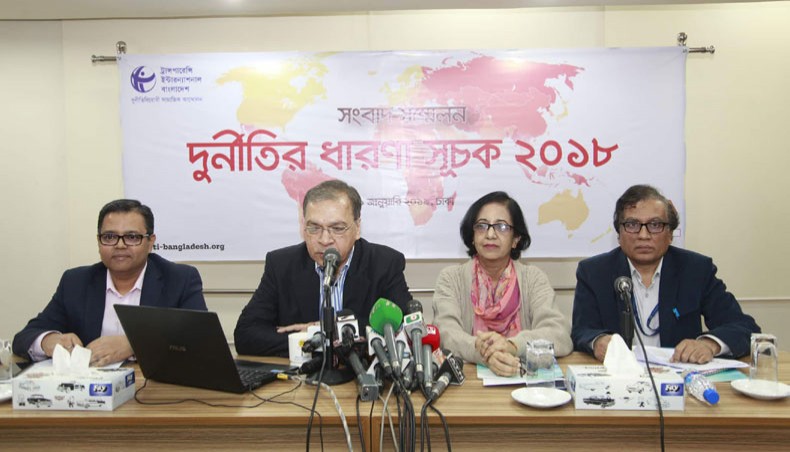TI sees graft on rise in Bangladesh
In 2018, Bangladesh ranked the 13th most corrupt country according the worldwide corruption perception index released by Berlin-based Transparency International.
In 2018, Bangladesh moved four notches up the global corruption index from 17th in 2017, according to the worldwide corruption perception index released by the Bangladesh chapter of Transparency International at a news conference at its office Tuesday.
The index provides corruption perception of 180 countries.
According to the index Bangladesh continued to be ranked the second most corrupt country among eight South Asian nations after Afghanistan.
The global watchdog found Bhutan, India, the Maldives, Nepal, Pakistan and Sri Lanka less corrupt compared to Bangladesh.
Bangladesh’s latest status relating to corruption was called as ‘embarrassing and alarming’ needing strong political will to fight the malaise, said TIB executive director Iftekharuzzaman while releasing the CPI.
According to the index in 2018 Bangladesh scored 26 out of 100 marks while in 2017 it had scored 28.
No country scored full marks and Denmark took the 1st place as the least corrupt nation scoring 88 marks.
Somalia emerged as the most corrupt country scoring 10 marks.
New Zealand took the second slot among the less corrupt country followed by Finland, Singapore, Sweden and Switzerland jointly taking the 3rd place in the corruption perception index.
Syria ranked as the second most corrupt country while South Sudan took the 3rd place.
In 2018, Bangladesh fell to 149th step in the ladder from 143rd in 2017, in the index of 180 nations.
According to the global corruption perception index, Bangladesh shared the same slot with the Central African Republic and Uganda.
Transparency International identified deficit of delivery against commitment, high profile corruption rarely addressed and pervasive conflict of interest- political and government position pervasive as means of enrichment as the factors that increased corruption in Bangladesh in 2018.
It also identified unabated financial and banking sector crisis including loan defaults and bank fraud, grabbing of land, river and water bodies; political control of contracting and recruitment business also contributed to the result.
It also said those embarrassingly high and unabated illicit financial transfers, weakening institutions of accountability, deficit in effectiveness and independence of Anti-Corruption Commission, denial syndrome, impunity- weakening rule of law and shrinking media and civil society space also as contributing factors.
It said that Bangladesh needed effective delivery of prime minister’s declaration of zero tolerance against corruption without fear and favour to perform better in the corruption index.
It recommended a national anti-corruption strategy to implement zero tolerance and effectively challenge impunity and bring the corrupt to justice irrespective of status or identity.
The TI stressed the need for effective institutions including Parliament, ACC, judiciary, Attorney General’s Office, office of Comptroller and Auditor General and the National Board of Revenue.
It also demanded professional integrity and impartiality of public servants, administration and law-enforcement agencies free from partisan political influence.
The TI stressed the need for robust access to information, faster, wider and deeper digitization and increased space for citizens, media, the civil society, the NGOs for effective voice and accountability.
Replying a question, Iftekharuzzaman told reporters that recently passed Civil Service Act 2018 would make the ACC weaker as the law stipulates that no government employee could be arrested before being charged in any criminal case and also that arresting them would require the authorities’ approval.
He also said that there was dim hope that Parliament would be effective with the ruling party clinching absolute majority.
In 2006, 2007, 2008, 2009 and 2010 Bangladesh was ranked 3rd, 7th, 10th, 13th, and 12th respectively.
Bangladesh was ranked 13th most corrupt country in 2011, 16th in 2012, 14th 2013 and 13th in 2014 and 2015.
News Courtesy: www.newagebd.net











